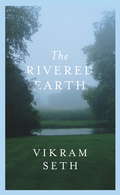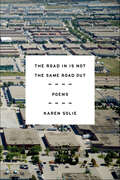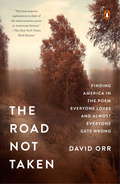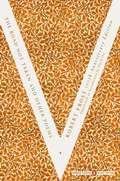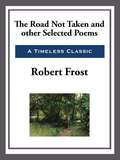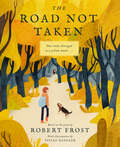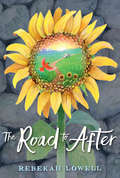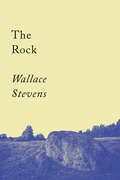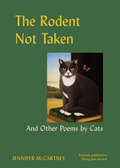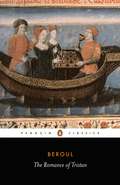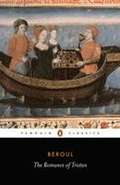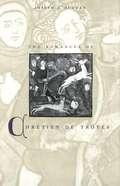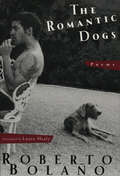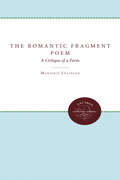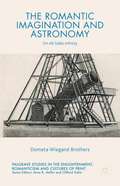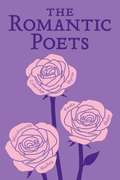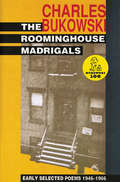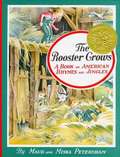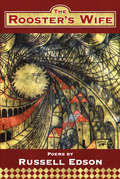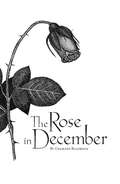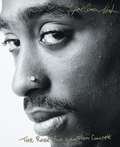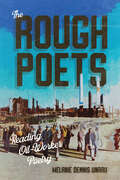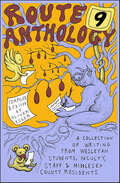- Table View
- List View
The Rivered Earth: From the author of A SUITABLE BOY
by Vikram SethThe Rivered Earth contains four libretti written by Vikram Seth to be set to music by Alec Roth - together with an account of the pleasures and pains of working with a composer.Entitled 'Songs in Time of War', 'Shared Ground', 'The Traveller' and 'Seven Elements', they take us all over the world - from Chinese and Indian poetry to the beauty and quietness of the Salisbury house where the poet George Herbert lived and died.Spanning centuries of creativity and humanity, these poems pulse with life, energy and inspired brilliance.They are accompanied by four pieces of calligraphy by the author.
The Road In Is Not the Same Road Out: Poems
by Karen SolieA profound new collection from one of poetry's rising stars"Introducing Karen Solie, I would adapt what Joseph Brodsky said some thirty years ago of the great Les Murray: ‘ . . . He is, quite simply, the one by whom the language lives.' . . . And, yes, as we embark on the third millennium of our so-called Common Era, she is indeed the one by whom the language lives." —Michael Hofmann, London Review of BooksA sublime singer of existential bewilderment, Karen Solie is one of contemporary poetry's most direct and haunting voices. A poet of the in-between places—the purgatory of wayside motels and junkyards, the abandoned Calgary ski jump and the eternal noon of Walmart—her poems stake out startlingly new territory and are songs for our emerging world, an age of uncertainty and melting icebergs. In Solie's new collection, The Road In Is Not the Same Road Out, she restlessly excavates our civilization, the moments of tough luck, casual violence, naked desire, and inchoate menace, pursuing "Beauty and terror / in equal measure" and fixing on the "Intrigue of a boarded-up building. / We want to get in there and find out what's the matter with it." Amplifying the elegant recklessness of her Griffin Poetry Prize–winning collection Pigeon, these poems bear an uncanny poetic intelligence and unflinching vision.
The Road Not Taken
by David OrrA cultural "biography" of Robert Frost's beloved poem, arguably the most popular piece of literature written by an American"Two roads diverged in a yellow wood . . ." One hundred years after its first publication in August 1915, Robert Frost's poem "The Road Not Taken" is so ubiquitous that it's easy to forget that it is, in fact, a poem. Yet poetry it is, and Frost's immortal lines remain unbelievably popular. And yet in spite of this devotion, almost everyone gets the poem hopelessly wrong. David Orr's The Road Not Taken dives directly into the controversy, illuminating the poem's enduring greatness while revealing its mystifying contradictions. Widely admired as the poetry columnist for The New York Times Book Review, Orr is the perfect guide for lay readers and experts alike. Orr offers a lively look at the poem's cultural influence, its artistic complexity, and its historical journey from the margins of the First World War all the way to its canonical place today as a true masterpiece of American literature. "The Road Not Taken" seems straightforward: a nameless traveler is faced with a choice: two paths forward, with only one to walk. And everyone remembers the traveler taking "the one less traveled by, / And that has made all the difference." But for a century readers and critics have fought bitterly over what the poem really says. Is it a paean to triumphant self-assertion, where an individual boldly chooses to live outside conformity? Or a biting commentary on human self-deception, where a person chooses between identical roads and yet later romanticizes the decision as life altering?What Orr artfully reveals is that the poem speaks to both of these impulses, and all the possibilities that lie between them. The poem gives us a portrait of choice without making a decision itself. And in this, "The Road Not Taken" is distinctively American, for the United States is the country of choice in all its ambiguous splendor.Published for the poem's centennial--along with a new Penguin Classics Deluxe Edition of Frost's poems, edited and introduced by Orr himself--The Road Not Taken is a treasure for all readers, a triumph of artistic exploration and cultural investigation that sings with its own unforgettably poetic voice.
The Road Not Taken
by David OrrA cultural "biography" of Robert Frost's beloved poem, arguably the most popular piece of literature written by an American"Two roads diverged in a yellow wood . . ." One hundred years after its first publication in August 1915, Robert Frost's poem "The Road Not Taken" is so ubiquitous that it's easy to forget that it is, in fact, a poem. Yet poetry it is, and Frost's immortal lines remain unbelievably popular. And yet in spite of this devotion, almost everyone gets the poem hopelessly wrong. David Orr's The Road Not Taken dives directly into the controversy, illuminating the poem's enduring greatness while revealing its mystifying contradictions. Widely admired as the poetry columnist for The New York Times Book Review, Orr is the perfect guide for lay readers and experts alike. Orr offers a lively look at the poem's cultural influence, its artistic complexity, and its historical journey from the margins of the First World War all the way to its canonical place today as a true masterpiece of American literature. "The Road Not Taken" seems straightforward: a nameless traveler is faced with a choice: two paths forward, with only one to walk. And everyone remembers the traveler taking "the one less traveled by, / And that has made all the difference." But for a century readers and critics have fought bitterly over what the poem really says. Is it a paean to triumphant self-assertion, where an individual boldly chooses to live outside conformity? Or a biting commentary on human self-deception, where a person chooses between identical roads and yet later romanticizes the decision as life altering?What Orr artfully reveals is that the poem speaks to both of these impulses, and all the possibilities that lie between them. The poem gives us a portrait of choice without making a decision itself. And in this, "The Road Not Taken" is distinctively American, for the United States is the country of choice in all its ambiguous splendor.Published for the poem's centennial--along with a new Penguin Classics Deluxe Edition of Frost's poems, edited and introduced by Orr himself--The Road Not Taken is a treasure for all readers, a triumph of artistic exploration and cultural investigation that sings with its own unforgettably poetic voice.
The Road Not Taken and Other Poems
by Robert Frost David OrrA deluxe edition of Frost's early poems, selected by poet David Orr for the centennial of "The Road Not Taken" For one hundred years, Robert Frost's "The Road Not Taken" has enchanted and challenged readers with its deceptively simple premise--a person reaches a fork in the road, facing a choice full of doubt and possibility. The Road Not Taken and Other Poems presents Frost's best-loved poem along with other works from his brilliant early years, including such poems as "After Apple-Picking," "The Oven Bird," and "Mending Wall." Award-winning poet and critic David Orr's introduction discusses why Frost remains so central (if often misunderstood) in American culture and how the beautiful intricacy of his poetry keeps inviting generation after generation to search for meaning in his work.For more than sixty-five years, Penguin has been the leading publisher of classic literature in the English-speaking world. With more than 1,500 titles, Penguin Classics represents a global bookshelf of the best works throughout history and across genres and disciplines. Readers trust the series to provide authoritative texts enhanced by introductions and notes by distinguished scholars and contemporary authors, as well as up-to-date translations by award-winning translators.From the Trade Paperback edition.
The Road Not Taken and Other Poems
by Robert Frost David OrrA deluxe edition of Frost's early poems, selected by poet David Orr for the centennial of "The Road Not Taken" For one hundred years, Robert Frost's "The Road Not Taken" has enchanted and challenged readers with its deceptively simple premise--a person reaches a fork in the road, facing a choice full of doubt and possibility. The Road Not Taken and Other Poems presents Frost's best-loved poem along with other works from his brilliant early years, including such poems as "After Apple-Picking," "The Oven Bird," and "Mending Wall." Award-winning poet and critic David Orr's introduction discusses why Frost remains so central (if often misunderstood) in American culture and how the beautiful intricacy of his poetry keeps inviting generation after generation to search for meaning in his work.For more than sixty-five years, Penguin has been the leading publisher of classic literature in the English-speaking world. With more than 1,500 titles, Penguin Classics represents a global bookshelf of the best works throughout history and across genres and disciplines. Readers trust the series to provide authoritative texts enhanced by introductions and notes by distinguished scholars and contemporary authors, as well as up-to-date translations by award-winning translators.From the Trade Paperback edition.
The Road Not Taken and Other Selected Poems
by Robert FrostRobert Frost is one of America's most beloved poets. He won four Pulitzer prizes for his poetry and was invited to read his poetry at John F. Kennedy's inauguration. His life was filled with personal tragedy which his poetry often reflected. Collected here are The Road Not Taken, The Death Of The Hired Man, The Mountain, Fire and Ice, The Generations Of Men, The Grindstone, The Witch of Coös, A Brook in the City, Design, House Fear, The Lockless Door, Storm Fear, and Snow Wilder Publications is a green publisher. All of our books are printed to order. This reduces waste and helps us keep prices low while greatly reducing our impact on the environment.
The Road Not Taken: A Selection Of Robert Frost's Poems
by Robert FrostThis splendidly edited volume offers a brilliant array of Robert Frost's most famous and well-loved poems, selected to display the full range of the poet's accomplishments.
The Road to After
by Rebekah LowellThis poignant debut novel in verse is a portrait of healing, as a young girl rediscovers life and the soothing power of nature after being freed from her abusive father. For most of her life, Lacey has been a prisoner without even realizing it. Her dad rarely let her, her little sister, or her mama out of his sight. But their situation changes suddenly and dramatically the day her grandparents arrive to help them leave. It&’s the beginning of a different kind of life for Lacey, and at first she has a hard time letting go of her dad&’s rules. Gradually though, his hold on her lessens, and her days become filled with choices she&’s never had before. Now Lacey can take pleasure in sketching the world as she sees it in her nature journal. And as she spends more time outside making things grow and creating good memories with family and friends, she feels her world opening up and blossoming into something new and exciting.
The Rock: Poems (Counterpoints #4)
by Wallace StevensAn excellent introduction to “the best and most representative American poet” (Harold Bloom), this palm–sized, keepsake edition is the first separate publication of this remarkable collection of late poems.In 1955, shortly before his death, Wallace Stevens earned the Pulitzer Prize for Poetry and the National Book Award for The Collected Poems of Wallace Stevens. The collection gathered most of his life’s work, and featured 25 previously unpublished poems. Stevens imagined that those poems would stand alone as their own volume—The Rock. Featuring some of his most memorable poems, including “Not Ideas about the Thing but the Thing Itself,” The Rock is a sublime selection of works from one of American’s most brilliant, beloved modernist.“After the reader has admired certain lines because Shakespeare might have written them, he begins to admire them because only Stevens could.” —Robert Fitzgerald“One might as well argue with the Evening Star and find fault with so much wit and grace and intelligence . . . such an overwhelming and exquisite command both of the worlds and of the rhythms of our language; such charm and irony, such natural and philosophical breadth of sympathy, such dignity and magnanimity.” —Randall Jarrell
The Rodent Not Taken
by Jennifer McCartneyA treasure trove of cat poetry, hidden from human eyes until now, reveals the humor and pathos of feline life. Curated by New York Times best-selling author Jennifer McCartney, this collection of poems—discovered at a cat cafe´ in Milan, Italy—showcases the breathtaking skill, witty intelligence, and breadth of knowledge possessed by the cat mind. McCartney knew she’d found something special as she translated the feline riffs on famous poems, beat poetry, rhyming verse, haikus, and limericks. From musings on a tardy dinner (“Feed Me”) to a trip to the vet (“A Cat’s Revenge”), the “clueless yammering” of sparrows in a birdbath to the pleasures of an empty box, these are special additions to the genre. Soon, in fact, the scribe was inspired to add some work of her own, as well as charming line drawings and photographs. This slim volume will entice anyone enamored of poesy and the fine arts—particularly cats, or people who like cats.
The Romance of Tristan: The Tale of Tristan's Madness
by BeroulOne of the earliest extant versions of the Tristan and Yseut story, Beroul's French manuscript of The Romance of Tristan dates back to the middle of the twelfth century. It recounts the legend of Tristan, nephew of King Mark of Cornwall, and the king's Irish wife Yseut, who fall passionately in love after mistakenly drinking a potion. Their illicit romance remains secret for many years, but the relentless suspicion of the king's barons and the fading effects of the magic draught eventually lead to tragedy for the lovers. While Beroul's work emphasizes the impulsive and often brutal behaviour of the characters, its sympathetic depiction of two people struggling against their destiny is one of the most powerful versions of this enduringly popular legend.
The Romance of Tristan: The Tale of Tristan's Madness (Penguin Classics)
by Beroul Alan FedrickOne of the earliest extant versions of the Tristan and Yseut story, Beroul’s French manuscript of The Romance of Tristan dates back to the middle of the twelfth century. It recounts the legend of Tristan, nephew of King Mark of Cornwall, and the king’s Irish wife Yseut, who fall passionately in love after mistakenly drinking a potion. Their illicit romance remains secret for many years, but the relentless suspicion of the king’s barons and the fading effects of the magic draught eventually lead to tragedy for the lovers. While Beroul’s work emphasizes the impulsive and often brutal behaviour of the characters, its sympathetic depiction of two people struggling against their destiny is one of the most powerful versions of this enduringly popular legend.
The Romances of Chrétien de Troyes
by Joseph J. DugganThis book has a double audience: the general reader interested in literature of the Middle Ages who is looking for an account of Chrétien de Troyes's romances set in the context of their period and the specialist in medieval French literature.
The Romantic Dogs: Poems
by Roberto Bolaño Laura HealyListed as a "2009 Indie Next List Poetry Top Ten" book by the American Booksellers Association: Roberto Bolano as he saw himself, in his own first calling as a poet. Roberto Bolano (1953-2003) has caught on like a house on fire, and The Romantic Dogs, a bilingual collection of forty-four poems, offers American readers their first chance to encounter this literary phenomenon as a poet: his own first and strongest literary persona. These poems, wide-ranging in forms and length, have appeared in magazines such as Harper's, Threepenny Review, The Believer, Boston Review, Soft Targets, Tin House, The Nation, Circumference, A Public Space, and Conduit. Bolano's poetic voice is like no other's: "At that time, I'd reached the age of twenty/and I was crazy. /I'd lost a country/but won a dream./Long as I had that dream/nothing else mattered...."
The Romantic Fragment Poem: A Critique of a Form
by Marjorie LevinsonThe fragment poem, long regarded as a peculiarly Romantic phenomenon, has never been examined outside the context of thematic and biographical criticism. By submitting the unfinished poems of the English Romantics to both a genetic investigation and a reception study, Marjorie Levinson defines the fragment's formal character at various moments in its historical career. She suggests that the formal determinancy of these works, hence their expressive or semantic affinities, is a function of historical conditions and projections.The English Romantic fragment poems share not so much a particular mode of production as a myth of production. Levinson pries apart these two dimensions and analyzes each independently to consider their relationship. By reconstructing the contemporary reception of such works as Wordsworth's "Nutting," Coleridge's "Christabel" and "Kubla Khan," Shelley's "Julian and Maddalo," and Keats's Hyperion fragments, and juxtaposing this model against dominant twentieth-century critical paradigms, Levinson discriminates layers, phases, and kinds of intentionality in the poems and considers the ideological implications of this diversity.This study is the first to investigate the English Romantic fragment poem by identifying the assumptions -- contemporary and belated -- that govern interpretative procedures. In a substantial summary chapter, Levinson reflects upon the meaning and effects of these assumptions with respect to the facts and fictions of literary production in the period and to the processes of canon formation.Originally published in 1986.A UNC Press Enduring Edition -- UNC Press Enduring Editions use the latest in digital technology to make available again books from our distinguished backlist that were previously out of print. These editions are published unaltered from the original, and are presented in affordable paperback formats, bringing readers both historical and cultural value.
The Romantic Imagination and Astronomy
by Dometa Wiegand BrothersThe Romantic Imagination and Astronomy is the first book to reconstruct the history of the science of astronomy and its importance to the Romantic imagination in exploration and colonization by imperial England. It examines how the science of astronomy in exploration and discovery, from Edmund Halley and William Herschel to Captain Cook, changed the world by tying the 'pure' science of astronomy to the practical, commercial, and martial aims of navigation for the maritime nation of England. It demonstrates that the same 'pure' science of astronomy also fueled the Romantic poetic imagination, influencing the evolution of form and content of poetry — from formation of the greater Romantic lyric of Barbauld and Coleridge, to the fantastic narratives of Keats and Shelley.
The Romantic Poets (Wordsworth Classics)
by Samuel Taylor Coleridge John Keats William Blake William Wordsworth Percy Bysshe Shelley George Gordon Lord ByronRomanticism gained traction in the late 1700s as writers moved away from the intellectualism of the Enlightenment and toward more emotional and natural themes. The major works of the movement’s five most famous poets--William Wordsworth, George Gordon Byron, Percy Bysshe Shelley, Samuel Taylor Coleridge, and John Keats--are represented in this handsome Word Cloud Classics volume, The Romantic Poets. One of the largest and most influential artistic movements in history, Romanticism valued intuition and pastoralism, and its themes are well represented in the verse of its stars. Lexile code: NP
The Roominghouse Madrigals: Early Selected Poems 1946-1966 (Colección Visor De Poesía Ser. #Vol. 417)
by Charles BukowskiThe Roominghouse Madrigals is a selection of poetry from Charles Bukowski's early work. It shows a slightly softer side to the beloved barfly.
The Rooster Crows
by Miska Petersham Maud PetershamIncludes well-known nursery rhymes, counting-out games, skipping-rope songs, finger games, and other jingles, such as: "The rooster crows and away he goes", "Mother, may I go out to swim", "Fuzzy Wuzzy was a bear", and "Roses are red, violets are blue". An American Mother Goose for every child's library, it contains verses from collections all over America, beloved by children for generations and beautifully and charmingly illustrated by famous artists.
The Rooster's Wife (American Poets Continuum #Vol. 90)
by Russell EdsonFor the past 40 years, Russell Edson has been producing a body of work unique in its perspective and singular in its approach. He is, arguably, America’s most distinguished writer of prose poems. Here are contorted Darwinian narratives of apes and monkeys exhibiting absurdly human behavior, along with his usual menagerie of elephants, horses, chickens, roosters, dogs, mermaids and mice. Along with his trademark humor, The Rooster’s Wife finds Edson contemplating age, mortality and immortality as well.Of Memory and DistanceIt’s a scientific fact that anyone entering the distance will grow smaller as he proceeds. Eventually becoming so small he might only be found with a microscope, if indeed he is found at all. But there is a vanishing point, where anyone having entered the distance must disappear entirely without hope of his ever returning, leaving only the memory of his ever having been. But then there is fiction, so that one can never really be sure if one is remembering someone who vanished into the distance, or simply who had been made of paper and ink . . .Russell Edson has been called a surrealist comic genius, a magician of metaphor and imagination. He is all of these, and a philosophical poet whose zany expeditions into the twisted labyrinths of logic resemble Lewis Carroll’s adventures through the wonderlands of paradox and illusion. Perhaps that is why even people who do not read significant amounts of contemporary poetry can immediately appreciate the playful accessibility of Russell Edson’s writing. What he pulls out of the hat of the subconscious is always unpredictable, immediate and surprising.Russell Edson’s books include The Very Thing That Happens (1964); The Childhood of an Equestrian (1973); The Tunnel: Selected Poems (1994); and The House of Sara Loo (Rain Taxi Chapbook Series, 2002). He lives in Darien, Connecticut.
The Rose In December
by Charlene BaldridgePoem by magical poem, Charlene Baldridge's The Rose in December (plucked from the James Barrie quote "God gave us memory so we might have roses in December") is as elegantly illuminating a ride through how life really is as it is entertainingly irreverent. (from the back cover) The poems in this book are: Art, White Nights, Inside the Hothouse, The Hammer and How It Works, What to Do About the Hammer, Gloves, Hearts of Onyx, A Poet's Love, Bereft, Ebony, Instructions, Stonehenge, Another Mountain, The Structure of Time, The Amaryllis, Make No Mistake, During the Power Outage, Guardian, Unprepared, Glitter, Mission Old Age, The Tender Gap, Out of Tune, Privilege. A Warrior's Stance, mentioned in this book and written by the author's deceased daughter, is available in this library.
The Rose that Grew from Concrete
by Tupac ShakurTupac Shakur's most intimate and honest thoughts were uncovered only after his death with the instant classic The Rose That Grew from Concrete. For the first time in paperback, this collection of deeply personal poetry is a mirror into the legendary artist's enigmatic world and its many contradictions. Written in his own hand from the time he was nineteen, these seventy-two poems embrace his spirit, his energy -- and his ultimate message of hope.
The Rough Poets: Reading Oil-Worker Poetry (McGill-Queen's Rural, Wildland, and Resource Studies #18)
by Melanie Dennis UnrauOil workers are often typecast as rough: embodying the toxic masculinity, racism, consumerist excess, and wilful ignorance of the extractive industries and petrostates they work for. But their poetry troubles these assumptions, revealing the fear, confusion, betrayal, and indignation hidden beneath tough personas.The Rough Poets presents poetry by workers in the Canadian oil and gas industry, collecting and closely reading texts published between 1938 and 2019: S.C. Ells’s Northland Trails, Peter Christensen’s Rig Talk, Dymphny Dronyk’s Contrary Infatuations, Mathew Henderson’s The Lease, Naden Parkin’s A Relationship with Truth, Lesley Battler’s Endangered Hydrocarbons, and Lindsay Bird’s Boom Time. These writers are uniquely positioned, Melanie Dennis Unrau argues, both as petropoets who write poetry about oil and as theorists of petropoetics with unique knowledge about how to make and unmake worlds that depend on fossil fuels. Their ambivalent, playful, crude, and honest petropoetry shows that oil workers grieve the environmental and social impacts of their work, worry about climate change and the futures of their communities, and desire jobs and ways of life that are good, safe, and just.How does it feel to be a worker in the oil and gas industry in a climate emergency, facing an energy transition that threatens your way of life? Unrau takes up this question with the respect, care, and imagination necessary to be an environmentalist reader in solidarity with oil workers.
The Route 9 Anthology: A Collection of Writing from Wesleyan Students, Faculty, Staff & Middlesex County Residents
by Oliver EggerThe Route Nine Anthology is a collection of poetry and prose from Wesleyan students, faculty, staff, and Middlesex County residents. It is the first collection of prose dedicated specifically to bridging the literary divide between the Wesleyan and Middlesex County communities.
